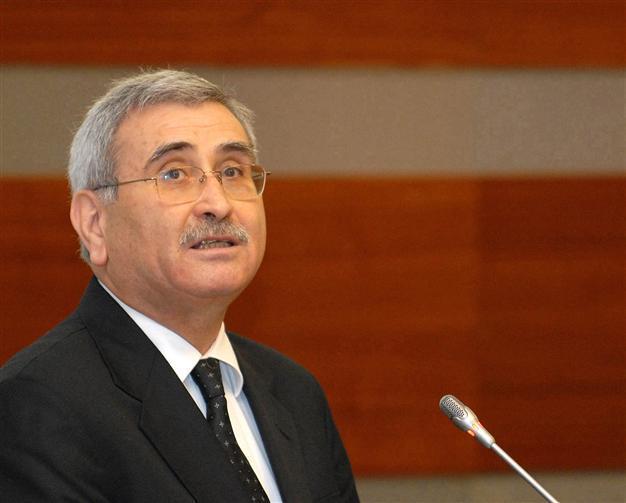Former chief slams central bank critics over interest rate policies
Vahap Munyar ANKARA

DHA Photo
Former central bank governor Durmuş Yılmaz has lashed out at the critics of the Central Bank’s interest rate policies amid ramped up pressure by the government for lower rates.
Opponents of the Central Bank’s interest rate policy would see what happens to economy in three months if they played with interest rates as they would like to, the former governor, who has been serving as outgoing President Abdullah Gül’s chief economic consultant, told daily Hürriyet columnist Vahap Munyar on the sidelines of Gül’s farewell reception on the night of Aug. 12.
Prime Minister Recep Tayyip Erdoğan, who was elected as Turkey’s 12th president in the Aug. 10 elections, has been the frontrunner opponent of the Central Bank’s policies, as he accuses the Bank of jeopardizing high growth opportunities by keeping interest rates high.
Economy Minister Nihat Zeybekci, who replaced another central bank critic Zafer Çağlayan in December 2013 has become the biggest supporter of Erdoğan’s rhetoric, as opposed to Deputy Prime Minister Ali Babacan and Finance Minister Mehmet Şimşek, who have been emphasizing the importance of the Central Bank’s independence.
When asked about the criticisms targeted at the Bank, Yılmaz recalled a presentation delivered by Başçı to members of the Parliament in Ankara.
“You can see the presentation on the Central Bank’s website. The elements of the manufacturing sector’s expenditures can be seen on the 22nd slide. The share of financing expenditures in the manufacturing sector is seen at 2.2 percent,” he said.
“Did dear Zeybekci ask if there is a mistake [with the numbers] when he saw that slide? If he didn’t, this means he accepted the validity that the financing cost’s share among the manufacturing sector’s expenditures is 2.2 percent.”
Zeybekci has repeatedly slammed the Bank “for overlooking increasing the financing costs of exporters and manufacturers.”
‘They need see to believe’In his remarks to Munyar, Yılmaz continued by expressing his disturbance with increasing pressure on the interest rate policies.
“There are some individuals that constantly tear into the Central Bank. Inwardly, I wish they would take an active role in the team deciding our country’s macroeconomic policies, with the Central Bank on top, and immediately implement everything they say. Let them play with the interest rate as they like, without considering macroeconomic balances. They would see where the economy would go within three months,” he said.
“If they want too much, they can add the changes they want in the Central Bank Law into one of the omnibus bills. They can authorize the Central Bank with just an emission duty and they can manage the remaining policies as they want,” he further said sarcastically.
When asked if these steps would not lead to problems in economy, Yılmaz said this is what he wants “these people” to see.
“Because they don’t believe anything without seeing,” he said.
1994 crisis exampleThe former central bank chief further recalled the 1994 economic crisis, as Başçı has previously done, to highlight how committed monetary policy mistakes could lead to drastic results.
In 1994, then-prime minister Tansu Çiller insisted on lowering the interest rate despite the market and finally caused an economic crisis.
“We saw that in the 1994 crisis, but there are people who forgot it; time passed over it,” Yılmaz said.
In the first quarter of 1994, the Turkish Lira was devalued more than 50 percent against the U.S. dollar, the Central Bank lost half of its reserves, interest rates skyrocketed and the inflation rate reached three digit levels.
Support for Babacan, ŞimşekYılmaz also commented on the escalating concerns over Turkey’s future monetary policy and the make-up of its economic management team.
He said Babacan and Şimşek’s presence in the Cabinet have been seen as “guarantors of stability in the economy.” He said in the case of a change in management, markets would remain unstable until seeing the policies of their successors.
“If the newcomers sustain the same policies fundamentally, the worries will not be permanent,” he stressed.
“Our country needs officials that create trust both inside and outside of the country, like dear Babacan. Then the economy would not be anchored to one or two people,” he added.
